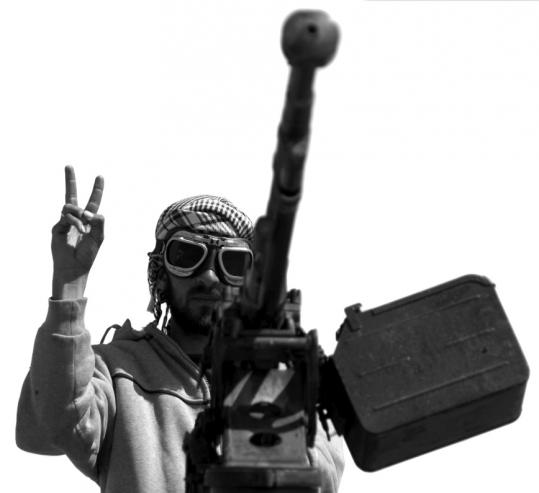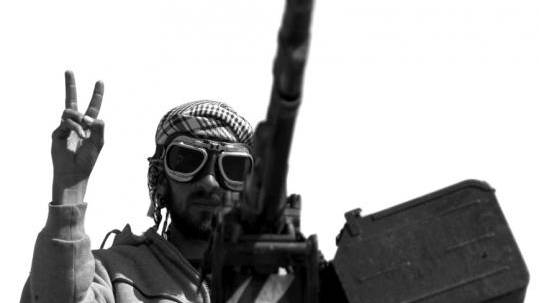False pretense for war in Libya
Source: boston.com

Evidence is now in that President Barack Obama grossly exaggerated the humanitarian threat to justify military action in Libya. The president claimed that intervention was necessary to prevent a “bloodbath’’ in Benghazi, Libya’s second-largest city and last rebel stronghold.
But Human Rights Watch has released data on Misurata, the next-biggest city in Libya and scene of protracted fighting, revealing that Moammar Khadafy is not deliberately massacring civilians but rather narrowly targeting the armed rebels who fight against his government.
Misurata’s population is roughly 400,000. In nearly two months of war, only 257 people — including combatants — have died there. Of the 949 wounded, only 22 — less than 3 percent — are women. If Khadafy were indiscriminately targeting civilians, women would comprise about half the casualties.
Obama insisted that prospects were grim without intervention. “If we waited one more day, Benghazi . . . could suffer a massacre that would have reverberated across the region and stained the conscience of the world.’’ Thus, the president concluded, “preventing genocide’’ justified US military action.
But intervention did not prevent genocide, because no such bloodbath was in the offing. To the contrary, by emboldening rebellion, US interference has prolonged Libya’s civil war and the resultant suffering of innocents.
The best evidence that Khadafy did not plan genocide in Benghazi is that he did not perpetrate it in the other cities he had recaptured either fully or partially — including Zawiya, Misurata, and Ajdabiya, which together have a population greater than Benghazi.
Libyan forces did kill hundreds as they regained control of cities. Collateral damage is inevitable in counter-insurgency. And strict laws of war may have been exceeded.
But Khadafy’s acts were a far cry from Rwanda, Darfur, Congo, Bosnia, and other killing fields. Libya’s air force, prior to imposition of a UN-authorized no-fly zone, targeted rebel positions, not civilian concentrations. Despite ubiquitous cellphones equipped with cameras and video, there is no graphic evidence of deliberate massacre. Images abound of victims killed or wounded in crossfire — each one a tragedy — but that is urban warfare, not genocide.
Nor did Khadafy ever threaten civilian massacre in Benghazi, as Obama alleged. The “no mercy’’ warning, of March 17, targeted rebels only, as reported by The New York Times, which noted that Libya’s leader promised amnesty for those “who throw their weapons away.’’ Khadafy even offered the rebels an escape route and open border to Egypt, to avoid a fight “to the bitter end.’’
If bloodbath was unlikely, how did this notion propel US intervention? The actual prospect in Benghazi was the final defeat of the rebels. To avoid this fate, they desperately concocted an impending genocide to rally international support for “humanitarian’’ intervention that would save their rebellion.
On March 15, Reuters quoted a Libyan opposition leader in Geneva claiming that if Khadafy attacked Benghazi, there would be “a real bloodbath, a massacre like we saw in Rwanda.’’ Four days later, US military aircraft started bombing. By the time Obama claimed that intervention had prevented a bloodbath, The New York Times already had reported that “the rebels feel no loyalty to the truth in shaping their propaganda’’ against Khadafy and were “making vastly inflated claims of his barbaric behavior.’’
It is hard to know whether the White House was duped by the rebels or conspired with them to pursue regime-change on bogus humanitarian grounds. In either case, intervention quickly exceeded the UN mandate of civilian protection by bombing Libyan forces in retreat or based in bastions of Khadafy support, such as Sirte, where they threatened no civilians.
The net result is uncertain. Intervention stopped Khadafy’s forces from capturing Benghazi, saving some lives. But it intensified his crackdown in western Libya to consolidate territory quickly. It also emboldened the rebels to resume their attacks, briefly recapturing cities along the eastern and central coast, such as Ajdabiya, Brega, and Ras Lanuf, until they outran supply lines and retreated.
Each time those cities change hands, they are shelled by both sides — killing, wounding, and displacing innocents. On March 31, NATO formally warned the rebels to stop attacking civilians. It is poignant to recall that if not for intervention, the war almost surely would have ended last month.
In his speech explaining the military action in Libya, Obama embraced the noble principle of the responsibility to protect — which some quickly dubbed the Obama Doctrine — calling for intervention when possible to prevent genocide. Libya reveals how this approach, implemented reflexively, may backfire by encouraging rebels to provoke and exaggerate atrocities, to entice intervention that ultimately perpetuates civil war and humanitarian suffering.
Alan J. Kuperman, a professor of public affairs at the University of Texas, is author of “The Limits of Humanitarian Intervention’’ and co-editor of “Gambling on Humanitarian Intervention.’’
Article from: boston.com
Image: Getty
The limits of humanitarian intervention: genocide in Rwanda By Alan J. Kuperman
Intervene in Libya? -- Prof. Alan Kuperman
Video from: YouTube.com






















